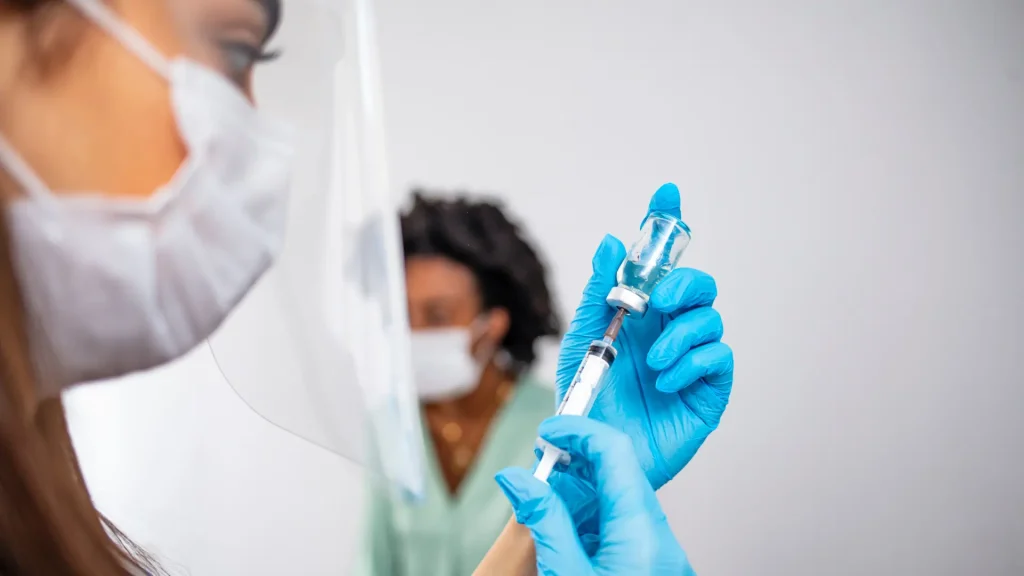
Did you know that Wegovy (semaglutide) has received an average rating of 7.3 out of 10, according to real-life patients on Drugs.com? Approximately 63% of reviewers reported a positive experience with Wegovy in their weight loss journey, emphasizing its safety and effectiveness in most Wegovy-treated patients.
Wegovy stands out for its efficacy in aiding long-term weight management. However, like any medication, it may have side effects. If you’re seeking a tolerable and effective solution for weight-related issues, it’s essential to consult a medical professional to understand Wegovy’s prescription and treatment procedure and receive thorough guidance.
This article will provide an in-depth look at Wegovy’s side effects, including common, rare, and serious ones, as well as clinical trial data for patient education to ensure the safe and effective use of Wegovy.
Key Takeaways
- Despite the numerous and significant weight-loss benefits, patients must be aware of potential Wegovy side effects and consult a healthcare provider before use.
- Patients must know that Wegovy side effects, such as nausea, diarrhea, and vomiting, are often temporary and may resolve independently once the body adjusts to the medicine.
- While Wegovy is generally safe for patients, medical professionals should explain that the treatment has rare occurrences of severe Wegovy side effects.
- 77.1% of study participants who received Wegovy achieved a weight loss of at least 5% of their body weight, whereas only 34.4% of those who received the placebo reached the same level of weight loss.
- Equipping patients with comprehensive knowledge empowers them to make decisions in their weight loss management journey.
About: Medica Depot is your trusted all-in-one supplier, offering a range of high-quality medical injectables and supplies. If you’re looking to order Wegovy online, our dedicated sales agents can give you proper guidance. We offer a worry-free experience in searching for the best and most popular products on the market. Whether for health professionals, plastic surgeons, dermatologists, licensed estheticians, or other specialists, we can offer genuine, brand-name products you may need. With Medica Depot, we prioritize serving you better to improve the patient’s quality of life.
What is Wegovy?

Wegovy is an injectable prescription medication designed to help adults with obesity or overweight who also have weight-related medical concerns. It can also aid adolescents aged 12 and older with their weight-related concerns. Wegovy is a once-weekly injectable medicine containing semaglutide, a glucagon-like peptide-1 (GLP-1) receptor agonist.
It helps individuals lose weight and maintain weight loss. Wegovy assists in long-term weight management by regulating appetite and reducing calorie intake. In particular, Wegovy can help individuals through these actions with consistent use of the injectable.
- Appetite Regulation: Semaglutide mimics GLP-1, an appetite hormone that naturally regulates appetite. It helps individuals feel fuller after meals, reducing overall food intake.
- Calorie Reduction: By slowing food movement from the stomach to the intestine, Wegovy decreases calorie absorption, aiding weight loss.
- Cardiovascular Risk Reduction: In addition to weight management, Wegovy recently received US Food and Drug Administration approval to lower the risk of major cardiovascular events in adults with heart disease and obesity or overweight.
Despite these numerous and significant weight-loss benefits, patients must be aware of potential Wegovy side effects and consult a healthcare provider before use. Medical professionals can help individuals understand the treatment procedure and the possible risks it can bring for patients.
Common Side Effects of Wegovy
According to the Frequently Asked Questions, the most common Wegovy side effects include nausea, diarrhea, vomiting, constipation, stomach (abdomen) pain, headache, tiredness (fatigue), upset stomach, dizziness, feeling bloated, belching, low blood sugar in people with type 2 diabetes, gas, stomach flu, heartburn, and runny nose, or sore throat.
Patients must know that these side effects are often temporary and may resolve independently once the body adjusts to the medicine. However, if these persist, they should seek immediate medical attention for proper management. Additionally, these are the most reported side effects that Wegovy patients encountered with their experiences and clinical trials.
- Nausea and Vomiting: Some individuals may experience mild to moderate nausea or vomiting after starting Wegovy. Fortunately, these symptoms often improve over time as the body adjusts to the medication.
- Diarrhea: Individuals can adequately manage this potential side effect by staying well-hydrated and adjusting their diet.
- Headache: Adequate hydration and rest may alleviate this Wegovy side effect.
It’s worth noting that these Wegovy side effects are generally mild and transient. Most people tolerate Wegovy well; its weight loss benefits often outweigh these temporary treatment discomforts. Patients must regularly do follow-up visits to allow medical professionals to address these Wegovy side effects and monitor progress.
Rare but Serious Side Effects of Wegovy
While Wegovy is generally safe for patients, medical professionals should explain that the treatment has rare occurrences of severe Wegovy side effects. It may occasionally occur, but individuals must know how to recognize when they experience the symptoms. Among many possibilities, here are several severe side effects.
- Thyroid Tumors: This treatment has the potential to cause thyroid cancer. Symptoms of this severe side effect include lump or swelling in the neck, hoarseness, trouble swallowing, or shortness of breath.
- Pancreatitis: The inflammation of the pancreas is a rare but potentially serious side effect. Symptoms include severe abdominal pain, nausea, and vomiting.
- Gallbladder Issues: Wegovy may increase the risk of gallbladder-related concerns, such as gallstones. Symptoms of this may include upper abdominal pain, bloating, or jaundice.
If patients experience these symptoms, seek medical attention promptly. These Wegovy side effects occur infrequently but require vigilance. Awareness of these risks is crucial, and a thorough consultation with medical professionals is essential before treatment. Patients should discuss their concerns with their trusted health providers to make informed decisions about their health.
Clinical Trial Data and Patient Case Studies

A STEP 4 randomized clinical trial assessed the effects of continued weekly subcutaneous semaglutide vs. placebo on weight loss maintenance in adults with overweight or obesity. Participants received semaglutide (2.4 mg once weekly) or placebo, resulting in semaglutide’s significant weight loss compared to placebo.
Meanwhile, 2.3% of participants experienced serious adverse events during the run-in period. When comparing continued semaglutide and placebo groups, the percentages were 7.7% and 5.6%, respectively. No new serious side effects were reported, with individuals often experiencing transient, mild to moderate gastrointestinal tract disorders as the most frequently reported adverse events.
Moreover, the participants who received semaglutide lost weight over an extended period (for the following 48 weeks). Wegovy’s safety profile was also favorable during this clinical trial. Furthermore, Novo Nordisk conducted a STEP 5 trial for 104 weeks.
Over 104 weeks, individuals using Wegovy alongside a reduced-calorie meal plan and increased physical activity achieved an average weight loss of 15.2%. In contrast, those on a placebo experienced only a 2.6% weight loss.
77.1% of study participants who received Wegovy achieved a weight loss of at least 5% of their body weight, whereas only 34.4% of those who received the placebo reached the same level of weight loss. However, in the 68-week trials, the most commonly reported adverse events associated with Wegovy included nausea, diarrhea, vomiting, constipation, and abdominal pain.
Managing Wegovy Side Effects and Patient Education


Health professionals significantly aid individuals in creating a tailored treatment plan for their Wegovy journey. In addition to the Wegovy dosing schedule, proper dosage and administration, and choosing between treatments like Wegovy vs Ozempic, these practitioners can help appropriately manage the Wegovy side effects.
- Consider eating bland, low-fat foods when encountering nausea or vomiting.
- Staying hydrated to prevent dehydration and opt for foods with water content, like soups, when experiencing diarrhea.
- Pay attention to when the headache starts, its duration, and its frequency. If it worsens or is unusual, discuss it with a healthcare provider.
Patient education is essential to feel comfortable and satisfied throughout their long-term treatment. Equipping patients with comprehensive knowledge empowers them to make decisions in their weight loss management journey. Individual experiences vary, so a tailored approach can work best for each patient.
- Stay Informed
- Track Symptoms
- Monitor Progress
- Avoid Ignoring New Feelings
Conclusion
Understanding the potential Wegovy side effects is crucial for healthcare providers and individuals considering this medication for weight management. It emphasizes the importance of monitoring and managing common side effects such as nausea and diarrhea, acknowledging that these are often temporary and manageable.
Shedding light on rare but severe side effects underscores the significance of prompt medical attention and thorough consultation before initiating Wegovy treatment. Clinical trial data and patient case studies are invaluable resources for facilitating informed decision-making and ensuring this weight management medication’s safe and effective use.
FAQs
1. What are the common side effects of Wegovy?
Common side effects of Wegovy may include nausea, diarrhea, vomiting, constipation, headache, fatigue, upset stomach, dizziness, and low blood sugar in people with type 2 diabetes, among others.
2. What are the rare but severe side effects of Wegovy?
Rare but severe side effects of Wegovy may include thyroid tumors, pancreatitis, and gallbladder issues, which require immediate medical attention if experienced.
3. How can individuals manage the side effects of Wegovy?
Individuals can manage common side effects like nausea and diarrhea by staying well-hydrated, adjusting their diet, and seeking guidance from healthcare providers. It is crucial to promptly seek medical attention if rare but severe side effects are suspected.
References
- Wegovy Reviews & Ratings. (n.d.). Drugs.com. Retrieved June 25, 2024, from https://www.drugs.com/comments/semaglutide/wegovy.html
- Rubino, D., Abrahamsson, N., Davies, M., Hesse, D., Greenway, F. L., Jensen, C., Lingvay, I., Mosenzon, O., Rosenstock, J., Rubio, M. A., Rudofsky, G., Tadayon, S., Wadden, T. A., Dicker, D., & STEP 4 Investigators. (2021). Effect of Continued Weekly Subcutaneous Semaglutide vs Placebo on Weight Loss Maintenance in Adults With Overweight or Obesity: The STEP 4 Randomized Clinical Trial. JAMA, 325(14), 1414–1425. https://doi.org/10.1001/jama.2021.3224
Clinical aesthetics products refer to a category of products used in the field of medical aesthetics or cosmetic dermatology. These products are typically designed and formulated to be used under the supervision of healthcare professionals, such as dermatologists, plastic surgeons, or trained aestheticians. They are distinct from over-the-counter cosmetics in that they often contain active ingredients or formulations that require expertise in their application or administration.
Examples of clinical aesthetics products include:
-
Dermal Fillers: Injectable substances used to add volume, smooth wrinkles, and enhance facial contours. Examples include hyaluronic acid fillers like Juvederm and Restylane.
-
Botulinum Toxin (Botox): Injectables that temporarily paralyze facial muscles to reduce the appearance of wrinkles caused by repetitive movements, such as frown lines and crow's feet.
-
Chemical Peels: Solutions applied to the skin to exfoliate and improve its texture. They can treat acne, pigmentation issues, and signs of aging.
-
Laser and Light Therapies: Devices that emit focused light or laser energy to treat various skin conditions, including acne, scars, and signs of aging.
-
Prescription Skincare Products: Formulations containing active ingredients like retinoids (vitamin A derivatives), hydroquinone, or prescription-strength antioxidants to address specific skin concerns under medical supervision.






